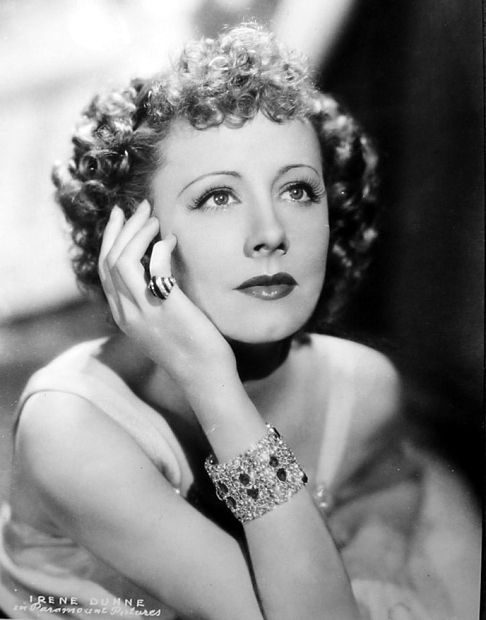“That's why there are so few women stars today. Pornography has taken away the mystery.”
A Visit With Irene Dunne (1977)
Irene Dunne was an American actress who appeared in films during the Golden Age of Hollywood. She is best known for her comedic roles, though she performed in films of other genres.
After her father died when she was 14, Dunne's family relocated from Kentucky to Indiana. She became determined to become an opera singer, but when she was rejected by The Met, she performed in musicals on Broadway until she was scouted by RKO and made her Hollywood film debut in the musical Leathernecking . She later starred in the successful musical Show Boat . Overall, she starred in 42 movies and was nominated five times for the Academy Award for Best Actress—for her performances in the western drama Cimarron , the screwball comedies Theodora Goes Wild and The Awful Truth , the romance Love Affair , and the drama I Remember Mama . Dunne is considered one of the finest actresses never to have won an Academy Award. Some critics feel that her performances have been underappreciated and largely forgotten, often overshadowed by later remakes and better-known co-stars.
After the success of The Awful Truth, she was paired with Cary Grant, her co-star in that movie, two further times; in another screwball comedy, My Favorite Wife , and in the melodrama Penny Serenade . She has been praised by many during her career, and after her death, as one of the best comedic actresses in the screwball genre. The popularity of Love Affair also led to two additional movies with her co-star of that film, Charles Boyer; those were When Tomorrow Comes and Together Again . Her last film role was in 1952 but she starred in and hosted numerous television anthology episodes until 1962 after having done numerous radio performances from the late 1930s until the early 1950s. She was nicknamed "The First Lady of Hollywood" for her regal manner despite being proud of her Irish-American, country-girl roots.
Dunne devoted her retirement to philanthropy and was chosen by President Dwight D. Eisenhower as a delegate for the United States to the United Nations, in which she advocated world peace and highlighted refugee-relief programs. She also used the time to be with her family—her husband, dentist Dr. Francis Griffin, and their daughter Mary Frances, whom they adopted in 1938. She received numerous awards for her philanthropy, including honorary doctorates, a Laetare Medal from the University of Notre Dame, and a papal knighthood—Dame of the Order of the Holy Sepulchre. In 1985, she was awarded a Kennedy Center Honor for her services to the arts.
Wikipedia

“That's why there are so few women stars today. Pornography has taken away the mystery.”
A Visit With Irene Dunne (1977)
How To Get Along In Hollywood (1948)
How Do I Stay Normal in Hollywood (1942)
How Do I Stay Normal in Hollywood (1942)
“One of the choicest occupations here is ripping reputations into pieces.”
How To Get Along In Hollywood (1948)
If You Want Success (Screenland Interview) (1961)
Everyone Loved Irene, by William Frye http://www.irenedunnesite.com/press/vanity-fair-march-2004/ Vanity Fair, 2004]
“Tackling one thing at a time, I have managed better than I would have thought possible.”
To Make You Hapier, by Roberta Orminston http://www.irenedunnesite.com/press/photoplay-april-1944/ Photoplay (April 1944).
How To Get Along In Hollywood (1948)
To Make You Hapier, by Roberta Orminston http://www.irenedunnesite.com/press/photoplay-april-1944/ Photoplay (April 1944).
A Visit With Irene Dunne (1977)
If You Want Success (Screenland Interview) (1961)
“I don't give my phone number to strangers. It's Plaza 5048.”
to her future husband when he asked for her phone number after their first dance.[citation needed]
The Girl Nobody Knows; New Movie Magazine, Reginald Taviner (October 1932) http://www.irenedunnesite.com/press/new-movie-magazine-october-1932/.
How Do I Stay Normal in Hollywood (1942)
“In addition to actual dramatic training and experience, I'd want as much education as possible.”
If You Want Success (Screenland Interview) (1961)
“Mother, an accomplished musician, taught me to play the piano as a very small girl.”
Hats, Hunches And Happiness (1945)
If You Want Success (Screenland Interview) (1961)
A Visit With Irene Dunne (1977)
If You Want Success (Screenland Interview) (1961)
Preofections - Irene Dunne, by Elizabth Wilson; Silver Screen (November 1936) http://www.irenedunnesite.com/press/silver-screen-november-1936/.
“No education is ever wasted and everything you learn is helpful in acting.”
If You Want Success (Screenland Interview) (1961)
“It's not possible to forget pictures. Anyone who works in them thinks of them constantly.”
How To Get Along In Hollywood (1948)
about her husband, Dr. Francis Griffin Revealing The Life Of Irene Dunne, by Adele Whitely Fletcher; The Modern Screen (September 1933) http://www.irenedunnesite.com/press/modern-screen-september-1933/.
McCall's, August 1962 http://www.irenedunnesite.com/press/mccall-s-august-1964/
How To Get Along In Hollywood (1948)
This is Really Irene Dunne, by Sara Hamilton http://www.irenedunnesite.com/press/photoplay-april-1936/; Photoplay (April 1936).
“This is an amazing business, creative and mechanical at the same time.”
If You Want Success (Screenland Interview) (1961)
“Music was as natural as breathing in our house.”
Hats, Hunches And Happiness (1945)
“Any young girl aspiring to a theatrical career held Florenz Ziegfeld in a awe.”
Hats, Hunches And Happiness (1945)
[http://www.irenedunnesite.com/press/modern-screen-august-1935/ The Modern screen *August 1935).
“Our home in Louisville, Kentucky, where I was born on December 20, was one of great happiness.”
Hats, Hunches And Happiness (1945)
“I always demanded respect. I came prepared and expected others to do the same.”
A Visit With Irene Dunne (1977)
How To Get Along In Hollywood (1948)
Preofections - Irene Dunne, by Elizabth Wilson; Silver Screen (November 1936) http://www.irenedunnesite.com/press/silver-screen-november-1936/.